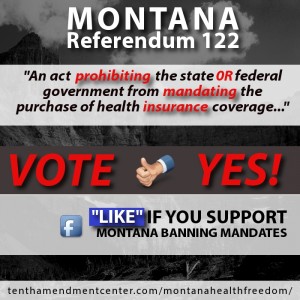 HELENA, Mont. – On Nov. 6, Montana residents will exercise their sovereign right and decide on health care freedom.
HELENA, Mont. – On Nov. 6, Montana residents will exercise their sovereign right and decide on health care freedom.
LR-122 would prohibit the state and federal governments from requiring any Montana citizen to purchase health insurance, or from “imposing any penalty, tax, fee or fine on those who do not purchase health insurance.”
Supporters in the legislature opted for a legislatively-referred state statute, figuring they would have a better chance of getting the bill enacted as a ballot measure, avoiding Democratic Gov. Brian Schweitzer’s veto pen.
Rep. Gary MacLaren (R-Victor) introduced the measure in the House. He called health insurance mandates a punishment for poverty.
“Who doesn’t have health insurance? People who can’t afford it. If they don’t [buy it] we’re going to fine them. So what are we doing? We’re fining people for being poor.”
Sen. Art Wittich (R-Bozeman) also supported the measure, calling the Patient Protection and Affordable Care Act a federal overreach.
“That’s not the role of government, to tell us what we have to buy.”
The full text of the measure is as follows:
LEGISLATIVE REFERENDUM NO. 122
AN ACT REFERRED BY THE LEGISLATUREAN ACT PROHIBITING THE STATE OR FEDERAL GOVERNMENT FROM MANDATING THE PURCHASE OF HEALTH INSURANCE COVERAGE OR IMPOSING PENALTIES FOR DECISIONS RELATED TO THE PURCHASE OF HEALTH INSURANCE COVERAGE; PROVIDING THAT THE PROPOSED ACT BE SUBMITTED TO THE QUALIFIED ELECTORS OF MONTANA; AND PROVIDING AN EFFECTIVE DATE.
LR-122 prohibits the state and federal governments from requiring the purchase of health insurance or imposing any penalty, tax, fee or fine on those who do not purchase health insurance. The prohibition does not apply to: (1) a court which orders the purchase of insurance when an individual or entity is a named party in a judicial dispute; (2) the state department of public health and human services as part of a child support enforcement action; or (3) the Montana university system as a requirement for students.
[] FOR prohibiting the state or federal government from mandating the purchase of health insurance or imposing penalties for decisions related to purchasing health insurance.
[] AGAINST prohibiting the state or federal government from mandating the purchase of health insurance or imposing penalties for decisions related to purchasing health insurance.
Unsurprisingly, opponents demonstrated their typically muddled understanding of the Constitution’s “Supremacy Clause” arguing that LR-122 wouldn’t make any practical difference because the Supreme Court ruled the federal insurance mandates constitutional.
The Associated Press reported:
If there is any conflict between state and federal laws, the federal law wins. That’s called the Supremacy Clause of the U.S. Constitution, said University of Montana law professor Anthony Johnstone.
“This means that while the Montana Legislature or the people of Montana may pass laws that conflict with federal law, such laws are unenforceable as a practical matter,” Johnstone said in an analysis of the ballot questions in response to an Associated Press query.
Wittich said it was still important to pass the initiative because if enough states push back, the feds will have to listen to the people.
Tenth Amendment Center communications director Mike Maharrey blasted Johnstone for perpetuating a bastardized understanding of federal supremacy, pointing out that only acts passed “in pursuance of” the Constitution stand as the supreme law of the land. Without a constitutionally enumerated power to support them, Congressional acts are nothing more than an illegal usurpation of power.
“These so-called legal scholars can blather on in condescending tones all they want, but that doesn’t mean they know what the hell they are talking about,” he said. “These clowns completely ignore the key phrase in the supremacy clause ‘in pursuance of.’ Sure, the Supreme Court gave us its opinion on the constitutionality of Obamacare. But their opinion is based on about 100 years of unconstitutional precedent. My challenge to Johnstone and his like-minded colleagues is to point to me the enumerated power that delegates Congress the power to create a one-size-fits-all federal health care system. They can’t – because it doesn’t exist.”
*******
For more information on health freedom legislation across the U.S., click HERE.
For information on health care nullification legislation, click HERE.
For model health care nullification legislation, click HERE.
And if you want to get involved in leading a health care nullification movement in your state, click HERE.

